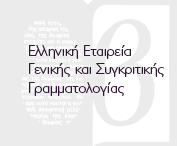Δεν διατίθεται περίληψη.
(EL)
This paper reviews some of the arguments developed recently around the "end" of literature with the advent of postmodernism and looks into their conceptual premises. The "end of literature" discourse is examined in relation to contemporaneous announcements of the end of history, of art as well as of the death of the author and the Cartesian subject, which have contributed to the formation of a wider problematic around the ending. The conceptualization of the "end" as both death and "telos" reveals the abandonment and renunciation of the essentially romantic ideals of beauty, unity, truth and originality on the part of much postmodern and contemporary literature, and the subsequent problematisation of literary history itself as linear and progressive. While literature is still being produced in great numbers, what is witnessed today is the "end" of teleological thinking, which becomes apparent in the altered modes through which literature is both produced and consumed of late as well as in its changed status within contemporary society and culture. The decentering of the author / subject, the enhanced role of literary theory, the emphasis on language and intertextuality alongside a recognition of the essentially "constructed" nature of the literary work, which also makes it porous to the socio-historical specificities, designate the ending of a human-centred, subjective and metaphysical conception of literature that was still held by the modernist tradition, despite its extreme formal experimentations. The work of Samuel Beckett is often quoted as a landmark in this process of demolition of traditional humanist ideology and the turn toward a problematics of language that marks postmodern literature. On the border between the modern and the postmodern, Beckett's work condenses much of the terms through which the "end" of literature is experienced or indeed achieved. With reference mainly to his prose, and especially his later work How it is (1961), the paper argues that while Beckett's texts announce and virtually enact the end of language, humanist ideology, progressive history and meaning itself- still the end is at the same time cancelled and postponed by the cyclical dynamic of his works, the incessant talking of his characters and the potentialities of new meanings liberated by the break-down of language and existence to their elementals, against every cohesive theological or conventional ratio which is revealed as hierarchal, oppressive and unjust. Thus, any definitive notion of "the end" is in turn problematised. After looking at the political implications of contemporary culture's obsession with endings and novelty with reference to certain distinctions between the modern and the postmodern as theorized by prominent critics, the paper concludes that this discussion can be seen as an extension of the classic 17th C debate between the "ancient and the moderns" and as a symptom of modernity's eternal validation of the new. Rather than signifying the end of literature, the discourse of "ending" can then be taken, reversely, as simply an opportunity to reflect on the contemporary.
(EN)

